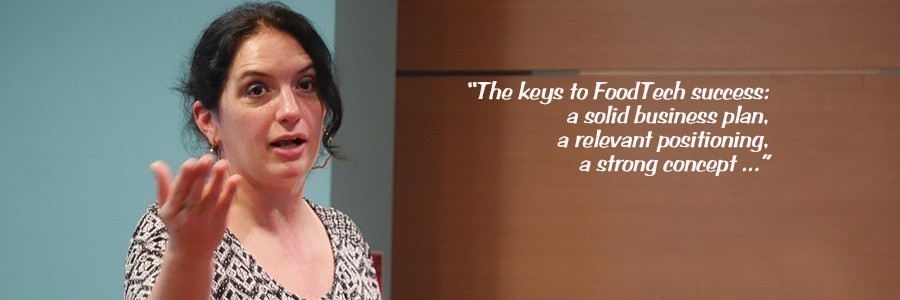
Last week, our AcceleRise program got off to a running start with a BootCamp day.
This was a chance for our 7 participants to get to know their pool of mentors through direct discussions, practical workshops, conferences and, of course, a moment or two of socialising and networking.
During the Bootcamp, we were lucky enough to listen to a fascinating presentation by Marie-Pierre Membrives, one of our lead mentors. And when I say lucky, I mean it – after 14 years of leading successful product development and marketing actions within McDonald’s Food Studio Europe, Marie-Pierre has developed a keen eye for what works and doesn't, and has much to teach us.
Now running her own consultancy, called Tastebuds, she will be supporting our FoodTech startups around their go-to-market strategies. Positioning your product, scaling up… words and questions that any startup needs to take note of.
Identifying your clients’ needs: the crux of positioning your offer
Marie-Pierre Membrives: A FoodTech product or service’s chance of success is clearly dependant on their positioning. To start with, it must be clear and easily identifiable. Next, how does it address a client need? The key questions in all this are “how can we identify these needs? Are emerging trends driving these needs? Or are the needs driving trends?"
In any case, one thing is for sure: for a startup to succeed, beyond having a solid business plan, they must have a relevant positioning for their offer and a strong concept to develop. Hence the need to keep tabs on your consumers and the food trends that characterise today’s markets and societies.
Clean label, vegetarianism, FoodTech… We can find any number of articles on trends. What is your takeaway?
Marie-Pierre Membrives: First of all, I feel we need to distinguish between what we can call “mega trends” (or background trends) and food trends. Mega trends can be identified over a number of years and have an overarching impact on our society. We are talking about, for example, urbanisation, globalisation, demographic changes, digitalisation etc.
These background trends have direct repercussions on the food sector. They can be the first signs of a major movement and can be a sources of inspiration for refining your market positioning.
We can read a lot of stuff about trends. To my mind, I have filtered out 7 food trends that I call Real & Fresh (freshness, authenticity, transparency), Care (which reflects our commitment to the planet or to our communities), Health First (an increasing awareness of the link between food and health), A Veggie World (reduction of animal protein consumption and increasing preoccupation with the environment and animal health and wellbeing), Discovery (the democratisation of ethnic flavours, and emerging cultural hybrids), Control (in particular through personalisation), and Connectivity (which covers the digitalisation of food production, retail and food service). These trends have been covered by Vitagora in its blog (in French) or its other trend newsletters [for members and AcceleRise participants only].
Overall, in food business, and in particular in the FoodTech sector, there is one thing that we cannot forget: we are talking about food. Food and eating are about enjoyment, socialising, taste. Never underestimate the importance of ‘food’ in FoodTech.
Scaling up: from the concept to large scale production, what are the solutions for a startup?
Marie-Pierre Membrives: The specificity of a startup is that they begin from a small scale and, ideally, see their activity develop rapidly. Many startups behind inventive products or services are fairly easy to manage thanks to the small size of their team, their limited offer and their agility. At stake for these startups is finding a level of sustainable growth, and transitioning to a larger scale of activity. This is the essence of scaling up.
This implies multiple steps, each with its own complexities: moving from concept to prototype, then to large scale industrial production without sacrificing quality. All the while respecting the constraints of the food sector (regulations, ingredients, nutrition, logistics, maintaining margins etc.).
Scaling up requires specific expertise in order to anticipate the challenges. And it’s rarely easy. Which is why putting together a team of professionals with a variety of skills and calling upon external resources and partners is so important.
By Christophe Breuillet

Managing director of Vitagora and AcceleRise, Christophe is the big boss! His various areas of expertise cover innovation and food business development, internationalisation and influence strategies… basically Food “Business” with a capital B! You can contact him at: christophe.breuillet@vitagora.com

